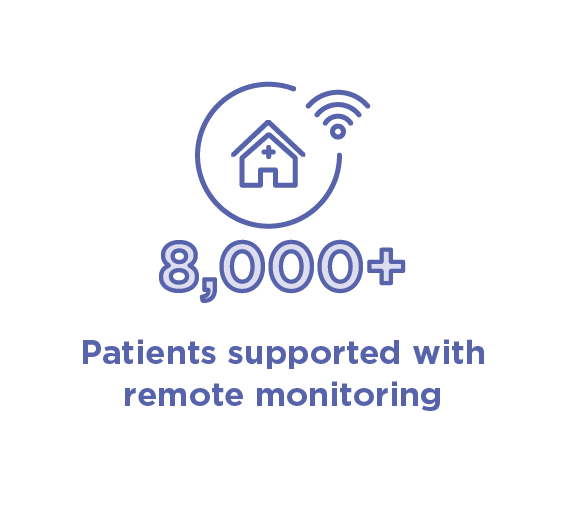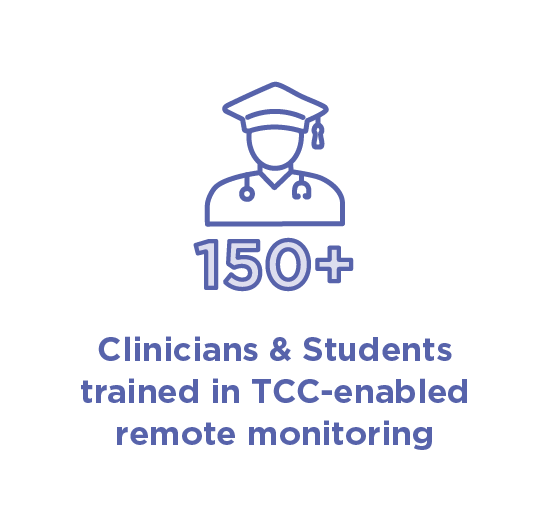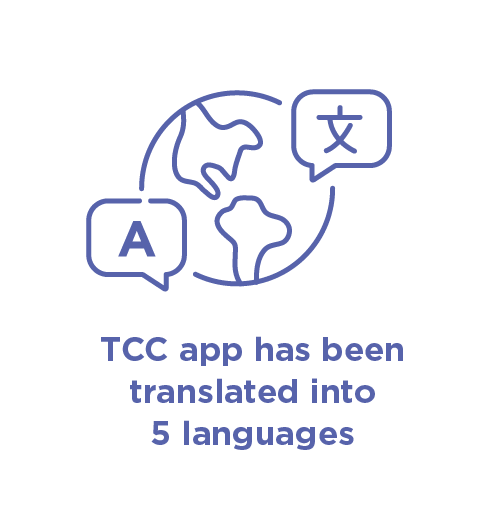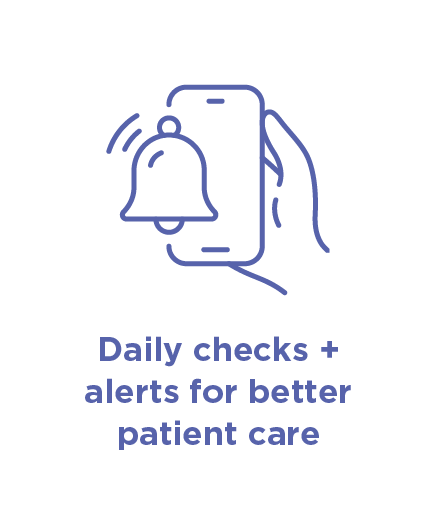The Maridulu Budyari Gumal, the Sydney Partnership for Health, Education, Research and Enterprise (SPHERE) is an NHMRC-accredited Research Translation Centre. We collaborate to deliver research-informed healthcare and training. The below case studies highlight our work in translating research into better health outcomes and building capability across the system.
Case studies on this page:

Case studies from all Research Translation Centres are available from Impact and outcomes.
Developing, re-designing or adopting platforms, systems or workforce initiatives
Challenge
Managing chronic comorbidities at home is a growing challenge for healthcare systems. Patients with multiple long-term conditions require frequent monitoring, timely interventions, and coordinated care, yet traditional models rely heavily on hospital or in-person visits. This can be burdensome for patients, particularly those who are frail, have mobility issues, or face social barriers.
Current digital health infrastructure and remote care systems are often fragmented, making it difficult to integrate real-time data, maintain continuity of care, and respond quickly to changes in a patient’s condition.
Without effective solutions, patients risk suboptimal care, clinicians face inefficiencies, and health services struggle to provide safe, equitable, and cost-effective care outside the hospital.
Approach
SPHERE allocated $200,000 in seed funding to establish the TeleClinical Care (TCC) platform; a digital health solution designed to integrate telehealth services with real-time patient monitoring.
Initially implemented within the Hospital in the Home (HITH) program, TCC focused on cardiovascular and COVID-19 patients, leveraging wearable devices and teleconsultations to deliver personalised, patient centred care.
The platform prioritised communication between patients and healthcare providers, enabling proactive management of health conditions in a home-based setting.
Significance
- Over 8,000 patients have been supported through TCC’s remote monitoring system, helping them transition from hospital to home safely
- More than 150 clinicians and medical students have been trained in TCC-enabled remote monitoring, improving the digital health workforce
- The TCC app has been translated into 5 languages, ensuring greater accessibility and inclusivity for diverse patient groups
- The system includes daily symptom questionnaires and real-time alerts, empowering patients to manage their conditions and alerting healthcare teams if a patient’s condition deteriorates.




Value-add of centre
SPHERE’s Big Ideas Health Service Research Grant funding and strategic guidance were key in transforming TeleClinical Care (TCC) from a proof-of-concept into a scalable digital health solution.
Partnerships facilitated by SPHERE were central to TCC’s success. Working with South Eastern Sydney Local Health District (SESLHD), the project integrated seamlessly with Hospital in the Home (HITH) services, while collaboration with Neuroscience Research Australia (NeuRA) added advanced rehabilitation features and data-driven insights.
By fostering these cross-sector partnerships and providing strategic support, SPHERE turned an innovative idea into a patient-centred solution with the potential to transform home-based chronic disease management.
Reach
The platform has helped thousands of patients across South Eastern Sydney, with a particular focus on aged populations and those managing chronic diseases.
By connecting patients, clinicians, and allied health professionals across multiple care settings, it has improved access to timely care, enhanced communication, and ensured coordinated, personalised support in the home.
Next steps
The platform is being adapted for aged care settings through the TCC-Community initiative, incorporating predictive analytics and enhanced communication for caregivers and clinicians.
This next phase will also integrate remote monitoring and medication tracking, enabling personalised, data-driven care while improving safety and quality for older patients.
By co-designing with aged care providers, the initiative aims to create a scalable model that can be applied across other communities and chronic care settings.
Providing better care
Challenge
Diabetes management is primarily coordinated by General Practitioners (GPs) as the first point of care, but patients are often referred to specialists prematurely, placing unnecessary strain on hospital services and resulting in wait times of up to 8 months.
In South Western Sydney, where diabetes prevalence is rising, this challenge is intensified by high cultural and socioeconomic diversity, with many patients facing language barriers, low health literacy, and limited transport options. These delays leave newly diagnosed patients without timely access to medication, education, or lifestyle support, which are critical steps in preventing complications.
If GPs are not better supported to manage less complex cases, pressure on the health system will continue to grow, increasing health inequities and compromising long-term outcomes.
Approach
Through its Diabetes, Obesity, and Metabolic Disease Clinical Theme, SPHERE established the Integrated Diabetes Action Group. By identifying service gaps, this group designed and launched the Diabetes Case Conferencing model with the aim of improving collaboration between GPs and specialist services.
This model facilitated virtual case conferences where GPs consulted with endocrinologists and diabetes educators on managing complex cases, enabling primary care teams to retain patient management responsibility.
Significance
Improved Clinical Outcomes:
- Haemoglobin A1c (HbA1c) levels decreased by an average of 1.0% (from 8.9% to 7.9%) in patients with complex diabetes
- Systolic blood pressure reduced by 8.2mmHg, improving cardiovascular health
- Body Mass Index (BMI) decreased by 1.3kg/m², supporting weight management efforts.
Reduced Specialist Referrals:
- The program minimised unnecessary hospital referrals, easing the burden on specialist services and reducing patient wait times.
Strengthened GP-led Care:
- Participating GPs reported greater confidence in managing diabetes independently, leading to better patient outcomes in primary care settings.
Sustained Impact:
- Clinical improvements were maintained over 3 years, demonstrating the program’s long-term effectiveness.
Value-add of centre
SPHERE facilitated collaboration among healthcare providers, specialists, and consumers, providing seed funding and creating evidence-based protocols to guide care. Specifically, the Diabetes Case Conferencing model has strengthened links between primary and specialist care, upskilled GPs, and ensured patients received timely, coordinated support tailored to their needs.
Reach
The program reached over 645 patients and involved 30 GPs across South Western Sydney, strengthening connections between primary and specialist care and expanding access to timely diabetes support across the region’s culturally and socioeconomically diverse communities.
Next steps
SPHERE is piloting a revised model where specialists visit GP practices for face-to-face consultations, integrating real-time patient input and further improving care coordination.
Meeting the needs of your end-users in your population
Challenge
Cancer care often lacks personalisation, particularly in identifying genetic predispositions for hereditary cancers, leaving families at risk. Traditional approaches typically rely on patients meeting strict criteria, such as age at diagnosis or family history, to access genetic testing. This can miss cases where inherited gene faults are present but not apparent, meaning potentially life-saving information is overlooked.
Through consultations with oncology teams and patients across New South Wales (NSW), this gap became clear and highlighted the need for a more integrated genomics-based approach. Rapid advances in tumour profiling and precision oncology have created both opportunities and complexities in care, requiring clinicians to navigate an expanding array of treatment options, emerging evidence, and clinical trial logistics. Families and clinicians alike face challenges in making informed, timely decisions without access to a coordinated multidisciplinary support system that combines genetic insights with tailored treatment recommendations.
Approach
SPHERE supported the establishment of the Precision Care Clinic at Prince of Wales Hospital, integrating genomic profiling with clinical care. The clinic reviews tumour profiles to identify actionable genetic mutations for personalised treatment and detects inherited gene faults through germline testing, with guidance from specialised genetic counsellors.
Multidisciplinary teams, including oncologists, pathologists, and cancer genetic specialists, work together to deliver tailored therapies and support proactive risk management for patients and their families.
Implementation scientists help refine clinic processes and protocols, ensuring evidence-based precision care can be delivered effectively and consistently.
Significance
The Precision Care Clinic has improved treatment outcomes by enabling personalised therapies tailored to each patient’s tumour profile.
It has also empowered patients and their families to understand and manage hereditary cancer risks through proactive assessments and prevention strategies.
Beyond individual care, the clinic has established a scalable model for integrating genomics into routine cancer care, providing a blueprint that can be adopted by other centres to extend the benefits of precision oncology more widely.
Value-add of centre
SPHERE’s multidisciplinary collaboration between genomic scientists, clinicians, and implementation experts ensured the clinic’s success. Funding supported the development of a scale-up toolkit to replicate the model nationwide.
This approach not only strengthens patient care through integrated expertise but also provides a roadmap for other hospitals to implement precision oncology services efficiently.
Reach
The clinic has treated over 200 patients while assessing hereditary cancer risks for dozens of families. Its model is now a blueprint for similar initiatives across Australia.
Next steps
SPHERE plans to expand the genomic profiling capabilities and improve accessibility in underserved regions, ensuring equitable access to precision oncology services across NSW and beyond.
The team will also continue refining the clinic’s scale-up toolkit to support the establishment of similar centres nationwide, helping more patients benefit from personalised cancer care.

